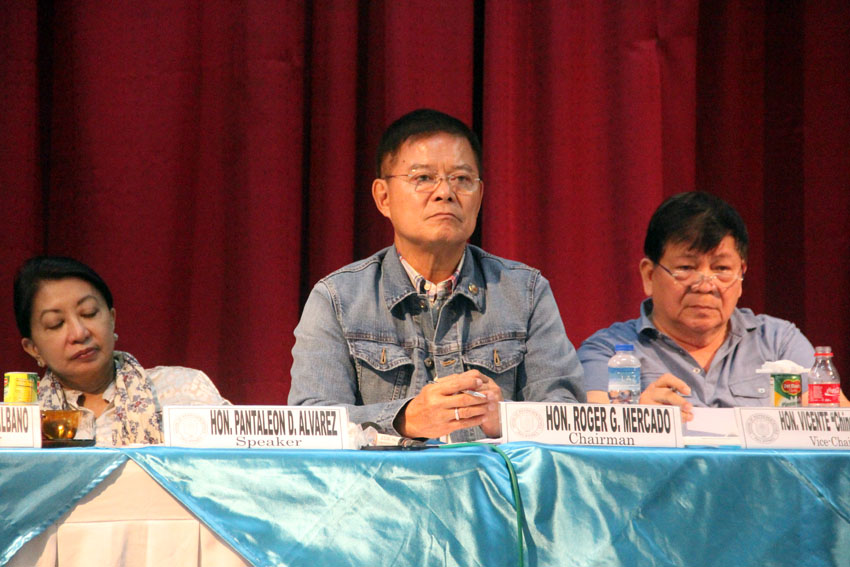
Southern Leyte Lone Distrtict Rep. Roger G. Mercado (center) leads the Public Consultation on Constitutional Reform on Federalism held Friday, March 3, 2017 at the University of Southeastern Philippines in Obrero, Davao City. Mercado is joined by other members of the Committee on Constitutional Amendments. (Zea Io Ming C. Capistrano/davaotoday.com)
DAVAO CITY, Philippines — Various sectors in this city are expecting the possibility of seeing Philippines under the federal system in the coming years. This comes after radical reforms to amend the 1987 Constitution are now taking shape led by the House Committee on Constitutional Amendments.
The committee was in Davao City on March 3, Friday, for a one-day Mindanao leg “Public Consultation on Constitutional Reform” held at the Barrio Obrero campus of the University of Southeastern Philippines.
“We strongly support and we believe that shifting the government into a federal system will eventually and substantially improve the country. Guiding with the following components embodied in the federal constitution,” Emmanuel Cifra, a former priest who now works with San Lorenzo Foundation, told Davao Today in an interview.
Cifra said that it is a must to amend the present constitution so that reforms that would pave way for a federal set-up would be implemented, pointing out that he preferred the constitutional convention as the mode of amendment.
“On the distribution of legislative powers, we want to know what the powers delegated on the national level and to the state or regional level,” Cifra said who is also a member of Lihuk Pideral sa Dabaw, a grassroot organization advocating a federal type of government.
Kerby Arafol, a political science student from University of Mindanao, emphasized that the constitutional reforms must “strengthen the democratic institutions” which he said could pave way for a stable transition towards federalism.
Arafol cited two points which he viewed as “critical” to the radical reforms being made in the 1987 Constitution: ”the harness conjugation” between the Executive and Legislature by shifting to a parliamentary form of government and the electoral party system reforms.
“Unlike Presidential systems, the parliamentary system offers a different paradigm in which the Prime Minister is also vested with legislative powers—conjugating the Executive and Legislative department,” he said.
“In a federal paradigm, the federal states can directly elect a representative to the parliament and then the parliament will choose its Prime Minister in accordance with the majority. But all of these reforms must be synonymous with electoral party system reforms,” he added.
Last Friday’s public consultation was attended by various groups from the academe, NGOs, cause-oriented groups, among others, with 150 people in attendance. The Visayas leg of the House committee’s public consultation is slated on March 17 in Bacolod and April 13 in Tacloban.
Chairperson of the Committee on Constitutional Amendments Roger G. Mercado said that constitutional reforms in the constitutions will be finalized once President Rodrigo Duterte convened both the Senate and Congress to discuss in the plenary the constitutional reforms for federalism.
“The president will issue a presidential proclamation convening both Houses for a constituent assembly,” Mercado, Southern Leyte lone district representative, said. (davaotoday.com)










